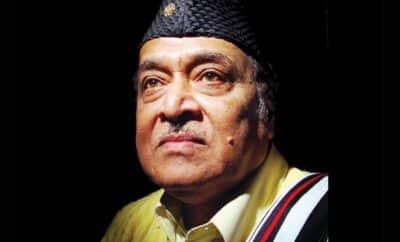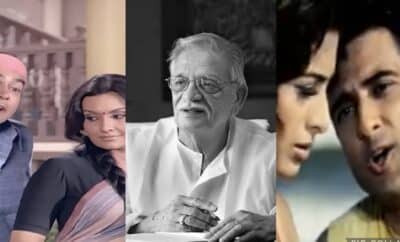Song Sketch
Zindagi Khwab Hai – Jaagte Raho – Life is but a Dream
Human beings are like a paradox. Contradicting what they think to what they do. Apparent, superficial and ostensible. Though like a paradox, they are not logically contradictory. Sant Kabir, in one of his dohas, has expressed this situation very interestingly –
Rangi ko narangi kahe
Baney doodh ko khoya
Chalti ko gaadi kahey
Dekh Kabira roya…
Kabir describes the nature of man which makes him live in a world of paradoxes and oxymorons. A fruit has a wonderful colour and man calls it na-rangi (colourless). Cooked, sweetened milk is called khoya (lost). The one which is on the go is called Gaadi (buried in the ground).Taking a cue from this very situation, Kaviraj Shailendra takes these paradoxes further to say –
Zindagi khwab hai
Khwab mein jhooth kya
Aur bhalaa sach hai kya….
And then he teases the above with –
Sab sach hai…..
Jaagte Raho (1956), based on the Bengali play Ek Din Raatre, was made in Hindi and Bengali simultaneously. In Hindi as Jaagte Raho and in Bengali as Ek Din Raatre. Directed by Amit Maitra and Shombhu Mitra, it is by far the best Raj Kapoor film, as an actor, which gets overshadowed by the rest of his extravagant ones. The Bengali version has Chhabi Biswas in place of Motilal. Hence the Bengali version of this song has been picturised on Chhabi Biswas and rendered by Manna Dey. Salil Chowdhury has given music to both the films while the Bengali lyrics of the song are by Salil Chowdhury himself.
A film which brings into light the misdeeds of the society through a tale of one night. An apt symbolical use of the words meaning stay alert or be watchful. A satire on so-called watchmen or the moral pillars of the society who themselves misconduct under the cloak of dark night. A rustic, innocent villager chased by the eminent persons of the society for the crime which he hasn’t committed. The film won the Grand Prix at the Karlovy Vary International Film Festival and was also the last film of Nargis under the RK banner. Though the film is from 1956, the mentality of the people hasn’t changed. The hypocrisy remains the same, the mentality remains the same. Jaagte Raho aesthetically breaks the myth and the disillusionment of the people. Jaagte Raho – the call of the watchman, is to awaken our conscience and sense of responsibility towards the society. The intricately made songs by Salil Chowdhury enhance the film’s plot while the narrative pattern of Shailendra’s lyrics bring forth the exact situation.
Dil ne humse jo kaha
Humne waisa hee kiya
Phir kabhi fursat se sochenge
Bura tha ya bhala….
A drunk man singing about not judging about his actions, living life fully and listening to what his heart says. Motilal excels in this role and it is interesting to see Mukesh giving him the playback while we also have Raj Kapoor on screen. The song begins with so much sensitivity, Raj Kapoor befriending a street dog and Salil Chowdhury uses oboe, flute and xylophone to lighten the atmosphere. The song is about paradoxes, remember? Raj Kapoor is so natural, he brings a smile on your face automatically. In comes the drunk Motilal singing the above Kabir doha and rest of the song. And of course Shailendra lifts up the mood as the song progresses.
Ek katra maey ka jab
Patthar ke honton par pada
Uss ke seene mein bhi dil dhadka
Ye uss ne bhi kaha….
He’s so much under the influence of alcohol. He praises it to glory saying that it is a life safer or rather life giver. A stone coming alive is a kind of paradox again.
The accordions make us go tipsy with Motilal. The violins and the guitar bring us back to the real situation. Did you know there’s also a cover version of this song by Manna Dey?
Ek pyaali bhar ke maine
Gham ke maare dil ko dee
Zeher ne maara zeher ko
Murde mein phir jaan aa gayi….
Paradox again, a dead coming alive after having a sip of the alcohol. Kaviraj excels here indicating there’s so much poison in our hearts, we’re as good as dead. The influence of alcohol changes all that, we become alive and then continues with zindagi khwab hai….it is all a dream, life is but a dream. Sab sach hai….it is real.
The picturisation supports the song aptly. Motilal wearing a crisp white dhoti and kurta which indicates that he belongs to the upper level of the society and yet he’s singing on the streets at night least bothered about his position and the outcome. Influence of alcohol does that!!
But then the song is also about how to live life in this moment. Philosophy and subtlety which only Kaviraj can bring out. How beautifully his paradox says – live your life as it comes, live happily. It is just a dream, an illusion and is going to pass away. Yet it is real and you are drunk walking.
Didn’t we all learn in our kindergarten –
Row, row, row your boat
Gently down the stream
Merrily merrily merrily merrily
Life is but a dream!




Abhaya Sharma
April 13, 2021 at 8:26 pm
Motilal was the man who introduced Mukesh to Hindi Cinema, in fact before the above cult song Mukesh had first sung for him in the Pehli Nazar .. the song ‘Dil Jalta Hai had caught Kundan Lal Saigal in a quizzical mood ‘ Yeh Gana Maine Kab Gaya.. ‘
The song is picturized on Motilal in 1956 RK Production Jagte Raho. Now Motilal as considered the most natural actor of early Hindi Cinema.. the film is one of the few RK Productions not directed by the Man himself, I remember, Boot Polish was another such early film..
It is a bit of a coincidence that I have recorded it today again at Starmaker for a second time..
Zindagi Khwaab Hai has every word throwing philosophy at us more so in these lines.. But prominently in
‘Ek katara May Ka Jab Patthar ke Hothon Par Pada,
Uske seene mei bhi dil dhadka ye usne bhi kaha .. ‘
..
Abhaya Sharma
Subu Vaikuntam
August 18, 2021 at 9:23 pm
Excellent analysis of this song from being a all-in-all paradoxical song. I didn’t look at it that way until now and this article gives a new perspective. Thanks ?
Jay Patri
June 7, 2023 at 5:07 am
You have done full justice to this wonderful song with your able review. More power to you !